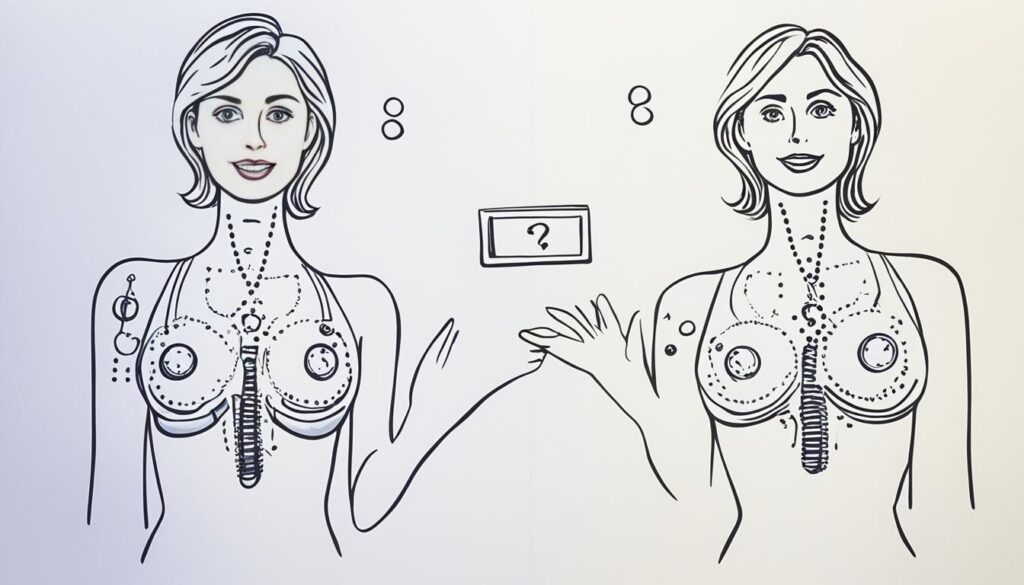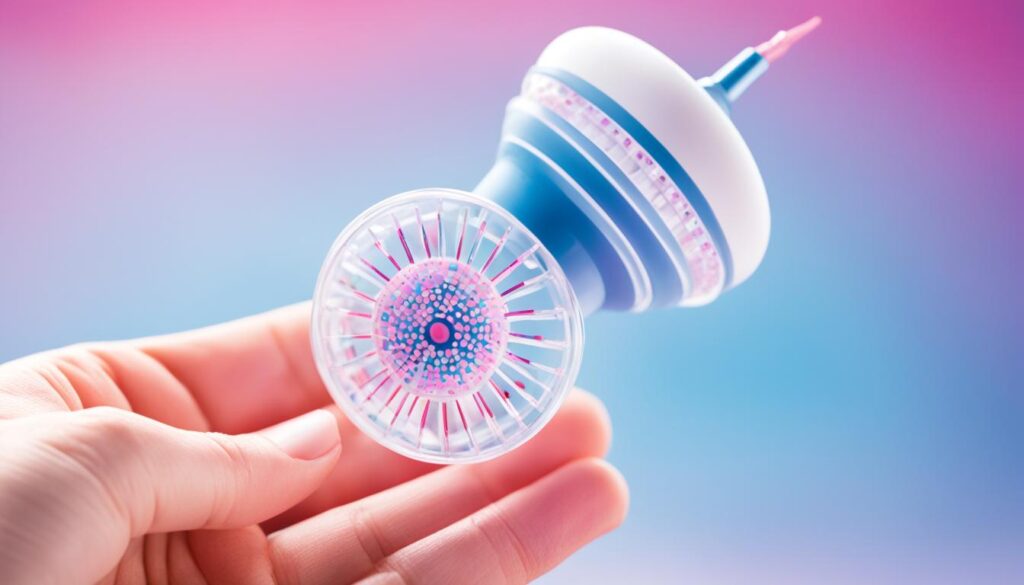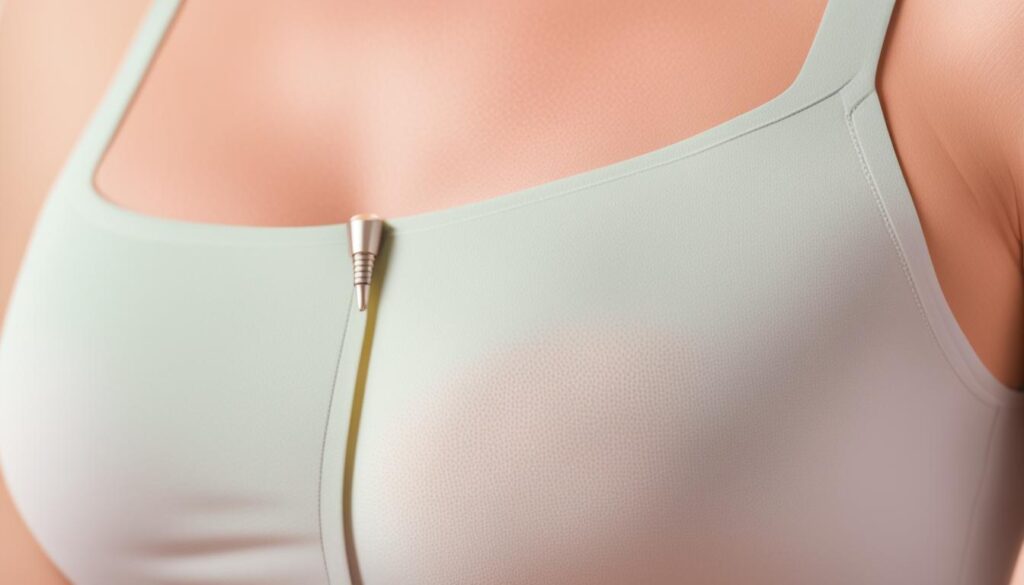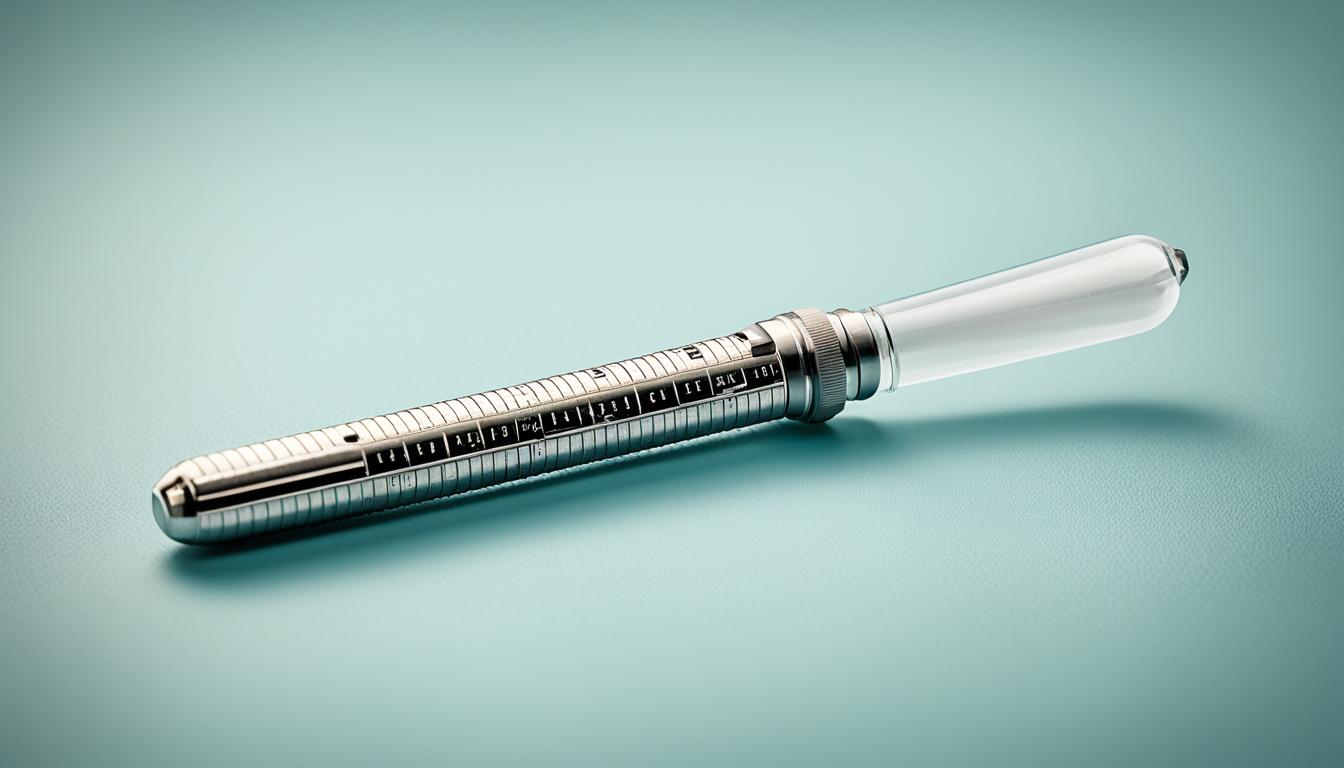Women often wonder about the influence of birth control on their bodies. A common question is whether a contraceptive implant can change your breasts. This thought crosses the minds of many, creating uncertainty.
The contraceptive implant is a tiny plastic rod. It’s about the size of a matchstick, 4cm long and 2mm thick. A medical professional inserts it under the skin of your upper arm. This implant sends progestogen into your bloodstream, preventing pregnancy. It does this by keeping the egg from releasing each month and thicken the cervix lining. This makes it hard for sperm to reach the egg. The implant works for 3 years and is 99% effective. But, some drugs can lower its effectiveness. While most women can use it, it might not be a good choice for those with certain health conditions.
Key Takeaways
- The contraceptive implant is a small, bendy plastic rod placed under the skin in the upper arm.
- It contains the hormone progestogen and releases it gradually into the bloodstream to prevent pregnancy.
- The implant is highly effective at 99%, but certain medications can reduce its effectiveness.
- Most women can use the contraceptive implant, but it may not be suitable for those with a history of breast cancer or other conditions.
- Temporary side effects of the contraceptive implant can include breast tenderness and changes in bleeding patterns.
Understanding Contraceptive Implants
The contraceptive implant is a small, bendy plastic rod, like a matchstick. It’s 4cm long and 2mm thick. A doctor or nurse places it under the skin in your upper arm. This implant slowly releases the hormone progestogen into your blood. This prevents pregnancy in two ways: by stopping the release of an egg each month and by making it hard for sperm to get through the cervix.
How Does It Work?
The implant works by releasing a steady low dose of progestogen. This makes pregnancy less likely in three important ways:
- It stops your ovaries from releasing an egg each month (ovulation).
- It thickens the mucus in your cervix, making it harder for sperm to enter the womb and reach an egg.
- It thins the lining of the womb, making it less likely for a fertilized egg to implant.
Effectiveness and Reliability
The implant is 99% effective in preventing pregnancy. This means almost no one using it will get pregnant in a year. Yet, certain medications can make it less effective. Always talk to your doctor about any drugs you’re taking to keep the implant working well as a form of birth control.
Eligibility and Accessibility
The contraceptive implant is a great birth control choice for many women. It works well even if you are breastfeeding. Yet, it might not be right for those with certain health issues. These include past breast cancer, serious liver disease, or a family history of heart problems. Before getting the implant, talk to your doctor. They will help you decide if it fits your health and lifestyle.
Who Can Use Contraceptive Implants?
This birth control method is safe for most women, even if they’re breastfeeding. It’s perfect for anyone looking for a long-lasting option. Yet, it’s not recommended for those with certain health issues. This includes past breast cancer or serious liver disease. Your doctor can check if the implant is the best option for you.
Where Can I Get an Implant?
Getting a contraceptive implant is easy. Just book an appointment at any Devon Sexual Health clinic. There, a doctor or nurse will talk about your medical history and any concerns. Then, they’ll insert a small rod under your skin, usually in your upper arm. This is a quick and nearly painless process that doesn’t need stitches. Afterward, you’re protected against pregnancy for up to three years.
Potential Side Effects
After getting a contraceptive implant, you might feel headaches, nausea, and more. You may also have issues like breast tenderness and mood changes at first.
But, these problems usually go away as your body gets used to the implant.
Initial Side Effects
Right after you get your contraceptive implant, you could get headaches and feel sick. Breast tenderness and mood swings are also common at this time.
These side effects should slowly get better. Your body is just adapting to the new hormones.
Changes in Bleeding Patterns
While using the implant, your periods might change a lot. Some women get their periods more often, more randomly, or they last longer.
If the bleeding is an issue at first, it often gets better. There’s a good chance you might even stop having a period. This is not a problem. Your periods will go back to normal after the implant is taken out.
Other Possible Side Effects
Some people might see acne get worse or start if they didn’t have it before. So, acne is another thing to be ready for when you get the implant.

Can Birth Control Implants Affect Breast Size?
Using hormonal birth control, like contraceptive implants, may make your breasts feel or look bigger. The hormones can cause your body to hold more water, affecting your breasts. This is like how breasts change during your period.
Temporary Breast Changes
Breasts that become swollen or bigger because of birth control are usually back to normal in a few months. You might also feel breast pain or tenderness. This feels heavy, sore, and can go up to your armpit. It often happens right before your period.
Factors Influencing Breast Size Changes
Your body’s reaction to hormonal birth control and your breasts’ original size impact any changes. Not everyone will see a big change. Some might notice their breasts getting bigger, others won’t see much difference.
Implant Insertion and Removal Process
Getting a contraceptive implant is easy. First, a doctor or nurse numbs your arm. Then, they make a small cut and insert the implant under your skin. This quick process may make your arm feel a bit sore for a while.
Getting the Implant Fitted
The implant fitting is made to be trouble-free. The healthcare provider numbs your arm. They then insert a tiny, rod-shaped implant just under your skin. It usually takes under a minute, and you can leave the clinic right after.
Removing the Contraceptive Implant
Removal of the implant is also simple. The doctor numbs your arm and takes the implant out. There’s no need for stitches. After removal, your fertility quickly goes back to normal.

Risks and Precautions
The contraceptive implant is usually both safe and effective. Yet, there are some risks and precautions to keep in mind. Let’s dive into them.
Potential Risks
The small mark left by the implant usually heals well, and infections are not common. But, there is a small chance the implant might get infected or move. If this happens, reach out to your doctor. In very rare cases, the implant might accidentally end up in a blood vessel. This could mean you need surgery to remove it.
Some studies show a small risk of hormonal birth control being linked to breast cancer. Yet, the danger is very low. The benefit of preventing pregnancy through contraception is usually seen as a plus.
Precautions and Follow-up
It’s crucial to see your healthcare provider as advised. They will check if your implant is still in the right spot and working as it should. Report any changes in your period, strange bleeding, or new side effects quickly. Being aware and talking openly with your doctor is key to safely using your implant.
Hormonal Birth Control and Breast Cancer Risk
The link between hormonal birth control, like contraceptive implants, and breast cancer risk is under constant review. So far, research hasn’t given clear answers. Evidence does show a small increase in breast cancer risk with hormonal contraception use. But, the overall risk is still very low.
For many women, the benefits of using birth control to prevent pregnancy are greater than the minimal rise in breast cancer risk. It’s vital to talk openly with your doctor about your specific risks and choices. This discussion will help you both find the best birth control plan for you.

Scientists are still learning about the connection between birth control and breast cancer. The medical field always updates its knowledge to give the best advice. It’s important for you to think about the pros and cons. Then, make a decision that is right for your health and future goals.
Alternatives for Breast Size Enhancement
If you want to make your breasts bigger, note that birth control might not do much. Changes in size from birth control are usually not permanent. For a more stable option, look at non-hormonal choices like the copper IUD.
Chest Weightlifting Exercises
Chest weightlifting exercises can offer a more lasting impact. They target the muscles under your breasts, making them look bigger. Focusing on exercises like chest press, pullovers, and flys helps strengthen and tone these muscles. While they might not change your cup size directly, they can make your chest appear and feel firmer.
Using heavy weights and doing lots of repetitions boosts muscle growth for some. This could lead to an increase in bra size for a certain percentage of people.
Breast Augmentation Surgery
For those looking for a permanent change, breast augmentation surgery could be an option. However, very few can change their breast size naturally without surgery.

| Exercise | Benefits |
|---|---|
| Dumbbell Chest Press | Enhances strength and fullness of chest muscles |
| Dumbbell Pec Fly | Targets chest muscles and can contribute to increased muscle size |
| Alternating Dumbbell Press | Helps build chest muscle mass and definition |
| Push-ups | Strengthens chest, shoulders, and triceps muscles |
| Stability Ball Chest Press | Engages core muscles while targeting chest muscles |
| Up-Down Plank | Challenges chest muscles and core stability |
| Dumbbell Pullover | Targets chest and back muscles, contributing to overall upper body strength |
Conclusion
In short, contraceptive implants can cause short-term changes in your breasts. These changes, caused by hormones, usually go away. If you’re looking to increase your breast size, birth control might not be the best idea. Chest exercises or breast surgery could be better options for you.
Talking to your healthcare provider is key. Share your goals and discuss the possible side effects of hormonal birth control. Based on a recent study, combined oral contraceptives (COCs) don’t seem to cause larger breasts or risk of regrowth after reduction surgery. Still, it’s important to discuss the possible risks and benefits with your doctor. This will help you choose the best birth control for you.
